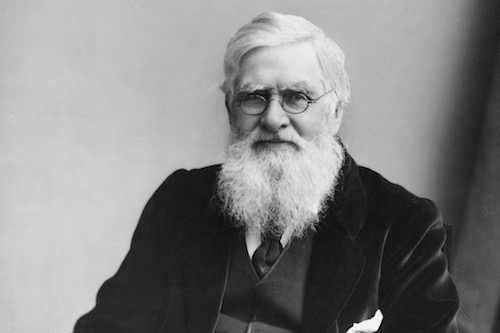 Evolution
Evolution
Darwin and Wallace Read Malthus Differently, and That Made a Big Difference

I cannot add anything to Wesley J. Smith’s cogent analysis of Michael Shermer’s recent article on Thomas Malthus. But since Shermer has brought up Charles Darwin and Alfred Russel Wallace’s association with Malthus in the development of their theories of natural selection (I say theories because they were different), a few words are in order.
A straightforward Malthusianism did indeed, as Shermer suggests, promote a harsh laissez-faire, nature “red in tooth and claw,” kind of socioeconomic system. No wonder, then, that when Oswald Spengler read Darwin’s Origin that he thought this conflation of biology and economics reeked of the English factory. But this was not Wallace’s Malthus. While Malthus may have given Wallace the idea of natural selection — an idea that occurred to him while suffering from a malarial fever on one of the remote Spice Islands — it was ultimately filtered through sources quite unfamiliar to Darwin.
As I’ve stated in Alfred Russel Wallace: A Rediscovered Life:
Darwin and Wallace each read Malthus differently. Darwin considered the food supply had to be on average constant with the increase of population geometrically; Wallace on the other hand saw the growth or depletion of a population due to available food and the ability of a given species to exploit it. In short, Darwin saw competition as taking place between individuals while Wallace saw competition as taking place between populations; thus competition led to modifications of a group under Darwin’s view with competition leading to changes in population size of several groups for Wallace. Darwin focused on individual struggles for existence while Wallace concentrated on population growth as the powerful modifying force in nature. Wallace saw evolution taking place not in an individual but in a demographic context. Both views had problems. Wallace failed to clearly distinguish varieties and variations; Darwin’s hypothesis was premised upon the inheritance of acquired characteristics, a notion exploded years later by August Weismann’s failed attempt to confirm the phenomenon in the experimental removal of successive generations of rat tails. Members of the Linnean Society hadn’t noticed any of these differences in 1858 [when the Darwin/Wallace papers were first read]. (p. 63)
Moreover, historian Greta Jones believes Wallace read Malthus through the eyes of social radical and political idealist Robert Dale Owen (see here). American economist and political theorist Henry George, like Wallace an outspoken proponent of land nationalization, in the words of Wallace biographer Ross A. Slotten,
subverted the Malthusian doctrine that population growth would outstrip the food supply and lead to a reduction in wages and greater poverty. The injustice of society, George asserted, not the limits of nature, caused destitution and misery. Under the right social conditions population growth ought to increase the collective power of the people to provide for one another, not diminish it.” (A Heretic in Darwin’s Court, p. 370)
Slotten calls George “a hero in the Wallace mold.” True enough!
I’ve also suggested that “For Wallace, Malthus was a malleable description of natural conditions not an ineluctable determinant of outcomes” (here, p. 96), and Wallace’s approach to Malthus is reflected best in Edward Bellamy’s Equality (see “The Malthusian Objection,” pp.409-412), a book that absolutely captivated Wallace.
So the sum total of all this is that Wallace was a “Malthusian” in the sense that the basic notion that populations increase geometrically while food supplies increase arithmetically prompted his idea of natural selection, but that is all. One must remember that Wallace believed that human beings were no longer under the influence of natural selection anyway. Any connections between Malthus and “social planning” would then be spurious. No wonder Wallace called eugenics “the meddlesome interference of an arrogant scientific priestcraft,” in stark contrast to the clear Darwinian connections to the movement witnessed right up to the eve of World War II.
Image: Alfred Russel Wallace, by London Stereoscopic & Photographic Company [Public domain], via Wikimedia Commons.
